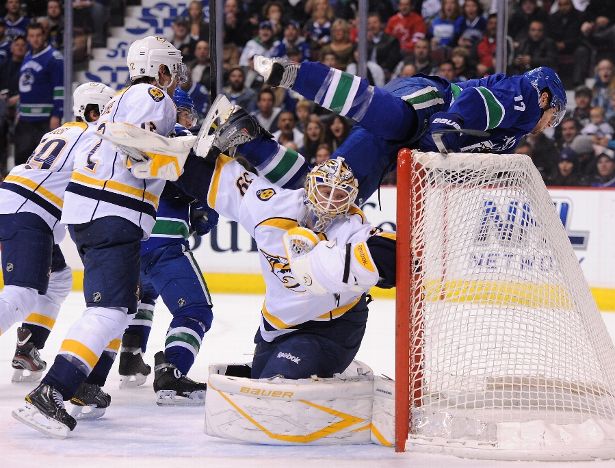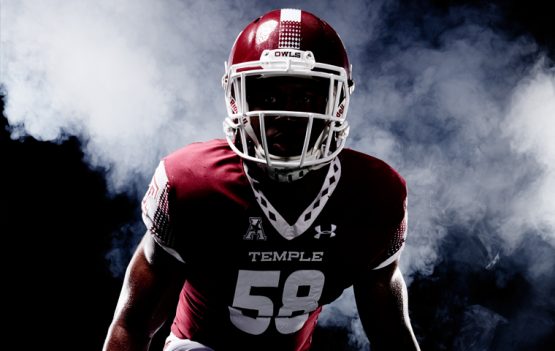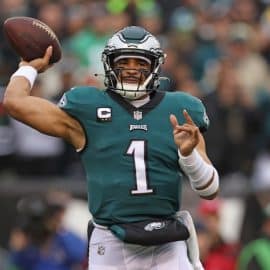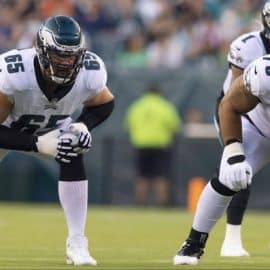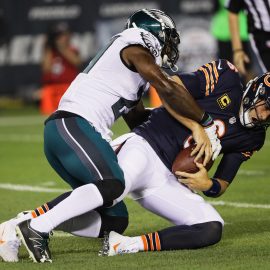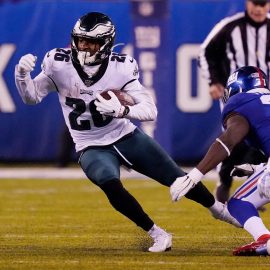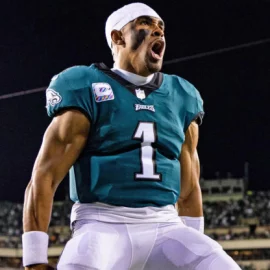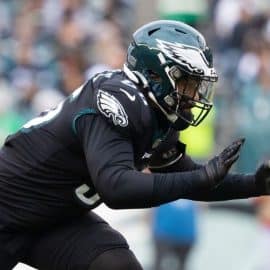It’s not a real popular subject, because a “two minute drill” implies the Eagles are behind at the end of a game…
I bring this up not so much because of a need to change the pace of the hideous media spin on the NFL right now because of the Gregg Williams bounty tapes, but rather to highlight how close we are to the OTA’s of a new season…
The OTA’s will be held this year on your regularly scheduled timetable… OTA stands for “organized team activities”… an off-season luxury of team “meet and greet” sessions normally scheduled after the Draft (April 26-28)…
But I have often wondered why NFL coaching staffs don’t hold their own “OTA”‘s to sharpen their management skills in the art of the two-minute drill…
I was watching some old film last night of Johnny Unitas… I guess it was vintage 1963 or so… and Unitas and the Colts were just dominating the final two minutes of a game (maybe it was against the Chiefs?) where the Colts had to score 3 to tie and 6 to win…
It was virtually a mellifluous drive… no spikey moments, no panic modes, no last-second sharts of confusion…
Unitas was masterful. Raymond Berry was on the same page. The Colts won going away with only seconds left on the clock, 17-13…
I immediately thought back to a game we lost to Washington a few years back. Our “two minute drilll” stalled on the Skins’ goal line with 0:00 left on the clock…
To be fair, there might be no more stressful tactical scenario in sports than the last minutes of a tight NFL game, and how coaches respond is as personal as their DNA. Some fail to think ahead, as Philly’s Andy Reid did when he left himself with only one TO in the final four minutes of a 10-3 loss to Washington on Dec. 21, 2007. The Eagles offense ended up stranded at the Skins’ 1 as the clock struck 0:00. Others jump the gun, as Pittsburgh’s Mike Tomlin did by calling timeout with 15 seconds on the clock to set up Jeff Reed’s go-ahead field goal over the Chargers on Nov. 16, 2007… That gave Philip Rivers & Co. time for a last-gasp play, which, even if it didn’t go their way—remember Troy Polamalu’s non-touchdown touchdown—was a gift opportunity. Very few coaches can block out the emotion and chaos and think clearly about the simple math. “You ask so many questions,” says former Ravens coach Brian Billick. “How will my offense hold up? How will the defense hold up? How do injuries factor into it? What personnel do we need? And you have to decide what to do in five seconds.”
There’s plenty of help out there if teams want it. John T. Reed, a Harvard MBA, Northern California real estate guru and former high school football coach, is the author of “Football Clock Management”, 280 pages of graphs and charts explaining how to handle time better. The book is also loaded with oft-forgotten mantras like “Every second you leave on the clock unnecessarily may be the one your opponent uses to beat you.” According to Reed, the Bills, Colts, Titans, Cowboys and Eagles have purchased it, and former Niners coach Mike Nolan even bought seven copies for himself and his staff. But given Nolan’s poor clock management during his three-plus years in San Francisco, Reed is unclear if he actually read the book. Or if any coach has, for that matter. “Coaches are reluctant to admit they don’t know everything about anything,” Reed says.
Most coaches do at least subscribe to a set of universal rules for the two-minute offense, meant to maximize the clock while simplifying playcalling. Among the most important of these:
1. No audibles by the QB, because they take, on average, anywhere from three to eight seconds.
2. Protections have to be called by the linemen before they’re in their stances, saving three seconds.
3. Always call formations in which the receivers line up near where their route will end so they don’t waste time running across the field.
4. Begin each play on a quick count (each “hut” takes a second) and end it by handing the ball to an official so he can set it “stat” (saving five ticks).
5. Hustle between snaps so that no-huddle plays melt 19 seconds, not 25.
6. If you throw away the ball, aim for the ground, as it takes an official longer to blow the whistle if he’s watching the pass float out of bounds.
7. Spike the ball no more than nine to 12 seconds after the previous play’s snap.
8. If you can’t stop the clock, leave at least 18 seconds for the field goal unit to set up and get a kick off. If you can stop the clock, do so with two seconds left, so that the game ends and your opponent can’t pull a 1982 Cal-Stanford redux.
Of course these rules can’t cover every last-second scenario, which is why most coaches have a position coach or coordinator in their ear helping them manage the clock. A few coaches even enlist a quantitative research analyst. These guys spend game days in a luxury box, clutching complex charts, breaking down info about time intervals between plays and relaying advice to the field. (Using computers during games is illegal.)
These math geeks prefer to remain anonymous; it’s an unwritten rule that only coaches should make strategic in-game decisions. But to some bosses, like Bill Belichick, there’s no one more valuable. The Patriots head coach lets only one voice come through his headset in a game’s final minutes: that of Ernie Adams, New England’s research chief, a boarding school friend of Belichick’s who’s fairly obsessed with the technical, historical and numerical minutiae that win and lose games.
Getting advice is one thing; following it is another. The smartest clock managers—an informal league poll cites Belichick and the Rams’ Jeff Fisher as the best—tell their offensive coordinators what they want to accomplish in advance of a given series. As it unfolds, they think two or three plays ahead, considering different scenarios. It’s calmer that way. Witness the Titans’ late, fourth-quarter drive against the Ravens on Oct. 5, 2007, while down 10-6. Fisher didn’t use a single timeout as his team marched 80 yards for the game-winning TD, converting two third-down plays along the way. “The longer you’ve done it, the better prepared you are,” Fisher says. “You’ve experienced everything.”
The poor game managers—the same poll cites Herm Edwards and Norv Turner—burn through timeouts like a teenager through cell-phone minutes, leaving them helpless late. Other mistakes occur when coaches try to simultaneously call plays and manage the clock, causing a system overload.
Something else I think Eagles coaches should “OTA” on— defensive timeout calling when behind. If you’re on D and need the ball back, never call time with between 2:10 and 2:00 left. Normally, an offense protecting a lead won’t pass, lest an incompletion stop the clock. But if a defense calls time under 2:10, it invites the offense to throw the ball, since the two-minute warning will stop the clock no matter which play is run.
Stuff like that fascinates me.
Notable transactions today and yesterday…
— Arizona re-signed RB Alfonso Smith to a 1-year, $540,000 contract…
— Ravens re-signed CB Lardarius Webb to a 6-year, $53 million contract, with $10 milz in signing bonus and $20 milz guaranteed…
— Bears signed CB Jonathan Wilhite (Broncos) to a 1-year deal, terms undisclosed…
— Bears signed CB Kelvin Hayden (Falcons) to a 1-year contract, terms undisclosed…
— Houston re-signed former Eagles S Quintin Demps to a one-year deal, terms undisclosed…
— Miami signed Strong Safety Tyrell Johnson (Vikings) to a 1-year contract, terms undisclosed…
— Miami re-signed LB Austin Spitler to a 1-year deal, terms undisclosed…
— Patriots signed LB Bobby Carpenter (Lions) to a 1-year deal, terms undisclosed…
— Steelers re-signed RG Ramon Foster to a 1-year contract at $1.26 million…
— Arizona re-signed P Dave Zastudil to a 2-year contract, terms undisclosed…
— Arizona signed S James Sanders (Falcons) to a 1-year deal, terms undisclosed…
— Carolina signed CB Reggie Smith (49ers) to a 1-year deal, terms undisclosed…
— Tampa Bay waived QB Rudy Carpenter…
— Colts signed DT Brandon McKinney (Ravens) to a 2-year contract, terms undisclosed…
— Chiefs re-signed CB Travis Daniels to a 1-year contract, terms undisclosed…
— Vikings signed CB Chris Carr (Ravens) to a 1-year deal, terms undisclosed…
Add The Sports Daily to your Google News Feed!
